Anatomy of an Era: Jon Pedersen, Part 2
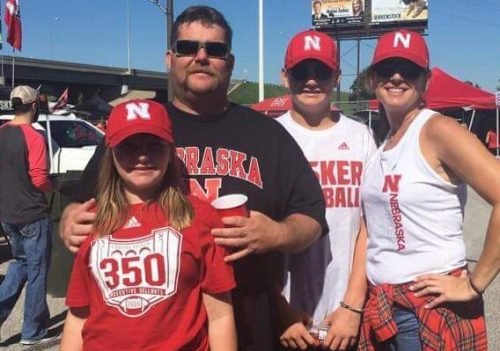
Excerpted from Chapter 90, No Place Like Nebraska: Anatomy of an Era, Vol. 2 by Paul Koch
Anatomy of an Era: Jon Pedersen, Part 2
Q: So the idea that Nebraska was just a football factory -in your experience that doesn’t hold water?
JP: Yeah. (Coach Osborne) was always just, “If you’re going to do it, do it right.” Everything was: “Do 100% of whatever your ability will allow you. But whatever your ability is, just help out the team.” It was about teamwork. One year it was Unfinished Business. How many times did we come so close and then just have one bad game?
Q: It seems to me after the Citrus Bowl it was, “Unity, Belief, Respect,” too?
JP: Yeah, that’s right. I remember that.
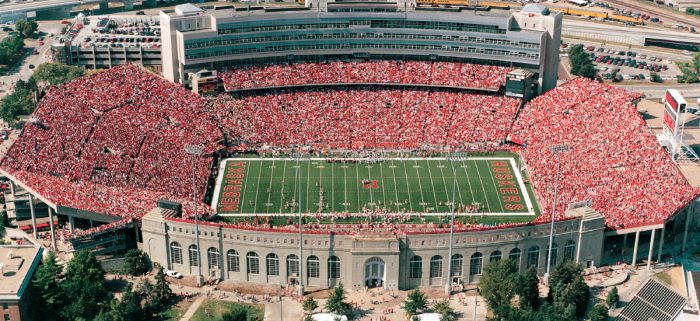
Q: So in your eyes, how did the program change during your time there. Any particular aspect, tenor, mood?
JP: A lot of it was just -you show up in ’90 and, obviously, it was a pretty good team- and I show up with guys like Brenden Stai, Zach Wiegert, Connealy, Cory Schlesinger, guys who became marquee household names. Donta Jones, all those guys, there were a bunch.
But I think everybody just, there was more -I don’t want to say we were all friends- but everybody had one goal in common. And I think going to Miami and losing in Miami those two years in a row, that was a feat in itself. And then actually being able to beat Miami in Miami for the championship, that was an accomplishment.
And just thinking back on that, a guy like Terry Connealy, he had a back injury and come Sunday or Monday he could hardly walk. And he’d spend the rest of the week getting limbered up for Saturday, so there had to be some determination there, don’t you think?
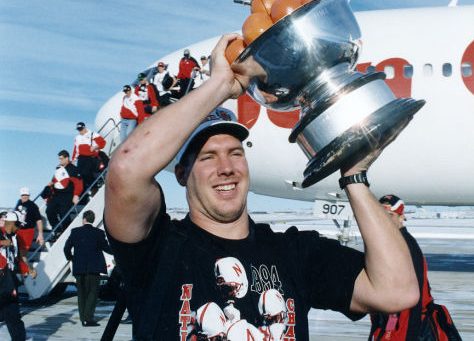
Terry Connealy
Q: A lot of ‘gutting it out’?
JP: A lot of guts and blood and good, old-fashioned hard work. Everybody was driven. I don’t know if it was having something to prove, we just got so good at winning, don’t you think?
Q: That’s one thing I’m delving into while talking to each one of you guys, Jon. It’s one thing to want to win, right? Because it beats the heck out of losing. But what was your prime motivation to deal with all of that stress and all of that toil? Why did you want to be a player and put yourself through that college football wringer?
P: Well, one thing, the game was just phenomenal fun. And two, it was just playing for the Nebraska Cornhuskers. But it was just the amount of hard work that everybody did, like all the hard work in the weight room during the offseason. I think one summer, the summer going into the ’93 season, I don’t think anybody went home. That was the thing. When I first showed up a lot of guys would go home for the summers, and every year that I was there more and more guys would stay there to work out. And it was the national championship year when nobody went home.
Q: Exactly.
JP: So that would be one major thing: just the level of commitment. And again, if you’re just a college student you got to go home and take several months off from school and do whatever, but there really wasn’t any time off. I remember Terris Chorney one year, I think it was right before spring break or right after the bowl game and we had one last offensive line meeting, and it was, “Hey, are we going to take these next two weeks off and do nothing, or are we going to get right back in the weight room on Monday so we don’t show up and get all sore again?” Well, we all voted. That was the thing, everybody voted. And there wasn’t one person who said we should take two weeks off. Everybody voted and we all showed up on Monday in the weight room. You know what its like, when you take those weeks off and then you get back into heavy lifting, you’re all busted up and sore.
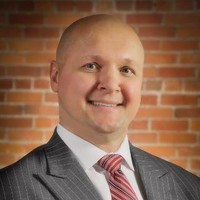
Terris Chorney
Q: It’s just like nowadays, when you get into middle age and get that delayed onset muscle soreness and all…
JP: Yeah. And, of course, you know. So on top of that you have the hard work, you have the dedication, and then you just have some ‘blood and guts’ tough people. Cory Schlesinger held the record for most broken helmets on an opposing team. How many guys did he knock out?
I don’t know how many times I saw the guy standing next to you pull a finger back in that was dislocated so they could stay in. A lot of guys would be hurt and not say anything because they didn’t want to sit out. You know, the thing was, there were a lot of these minor injuries like a sprained ankle and nobody would like to take the time off and say anything, it was just to stay in and not sit out and it was whatever you could do to help, any little thing.
Q: Plus, you didn’t necessarily want to give that guy behind you a chance to supplant you, right?
JP: That’s the thing, the level of competition -just at your own position- it was very competitive. There were a lot of guys. And even if you were a center you could still play guard, you know? And even if you were a guard you could play center. It was just the amount of competition.
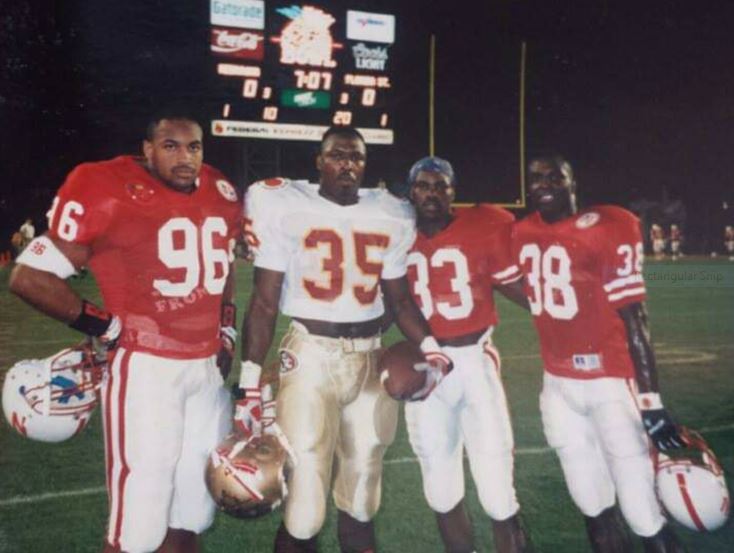
David White (far left)
Everybody was a tough guy, there was no wimping out. Obviously, that just wasn’t going to happen. Kevin Ramaekers, he was a tough guy. I don’t even think that guy ever had a pain threshold. John Parrella, too. There was David White. You remember David? That guy was just a killer. That guy used to play with bones sticking out of his body and covered in so much blood the referees would make him come off the field. He would have finger bones sticking out of the skin and would tape up and go back in. He was a tough em-effer!
A couple of the guys… Ernie Beler, remember him? People always ask, “You played Nebraska football. Did you ever get hit really hard?” Two guys that I’ll always remember: one being Ernie Beler, and another was Cory Schlesinger when he hit me from behind while I was blocking. But it was both by my teammates, you know what I’m saying? It was in a scrimmage or a practice -I never really got hit that hard in a game- Ernie Beler cleaned me one time on a punt, and then Cory Schlesinger ran up my back once. That was pretty painful.
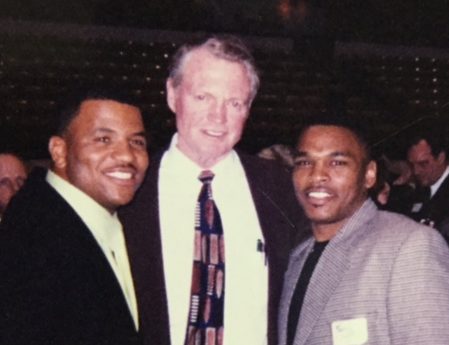
Ernie Beler, Tom Osborne & Kenny Wilhite
But yeah, it was just a lot of tough kids, a lot of hard work, and everybody was just dedicated. Outside of the off-field conduct that everybody got to read about in the paper, there really wasn’t a whole lot of other stuff other than breathe, eat and sleep Nebraska Football.
Q: So it was four to five years of just gutting it out and processing everything…
JP: Yeah, and it was a blast, you know? We were having the time of our lives. It was so much fun just hanging out and being friends.
Q: So the team unity was always there…
JP: Obviously you have cliques; you had the offensive linemen and you had the defensive linemen, and we always got along well, because it was those guys you were always playing with or practicing with and getting together for barbecues and stuff. And it would evolve every year because people would leave, but you’d have the younger guys stepping up.
Then you have the Peter boys showing up. There was a lot of hazing going on with that, when a new defensive lineman in a yellow jersey would get tackled down by Ramaekers or Engelbert. Just a lot of fun and a lot of tough dudes. They don’t make ’em that tough, anymore. I don’t know, maybe they do. They make them a lot bigger.
And I don’t think even any of the marquee guys, they didn’t worry about the NFL. Maybe they were, but the bottom line was, “We’re going to win that national championship.” That was the goal from the time we showed up as freshman. Then it would just slip away right at that last bowl game. And I think people got tired of that. We had a couple of losses in the season there, and at the time too, the Big 8 was really competitive. Oklahoma was good, Colorado was good, Kansas every now and then, Kansas State. Iowa State would slip in a win once in a while. What was that all about? (laughs) And Oklahoma State, too, even though sometimes that would look like a cakewalk. And maybe that’s how some teams like Iowa State would slip a win in there every once in a while, because you had your eyes on that prize that was the final game, and maybe we got to looking too far ahead and focusing on that and overlooked some stuff.
Q: Tell me how your injury happened.
JP: Well, that was at home versus Missouri, and they had wet the field down because we had the cheap turf, still, so we started the game out with the knobs, the turf shoes. We beat up on Missouri and we’re starting to rotate in in the third quarter. Brenden Stai had just broken his ankle the series before mine, so there was some down-time there. And we probably should have just switched shoes at the half, but we didn’t and just kept the knobs on and then we get in -and I’m trying to recall if Calvin Jones was the running back- but long story short, there was a pitch to the left: you run out and get tied up with the linebacker, and one of the defensive linemen was trying to tackle the running back there and kind of dove into a waist tackle… and their momentum carried into my foot, which was planted on a linebacker, and then it just twisted the foot and ended up dislocating my foot. So basically, my toes are basically behind my foot there.
There’s a picture of that moment that Bryan Pruitt has. It wasn’t fun. So Stai and I ended up in the hospital together. And his break wasn’t as bad, he was able to recover a lot faster because I don’t think he had any cartilage or stuff. My Achilles tendon was all messed up. And that was a problem going into spring ball that next year, because my Achilles didn’t quite heal up right, and every time you’d go out and put pressure on it it would just kind of fold. It wasn’t fun. It wasn’t a good time. A very disappointing way to go out.
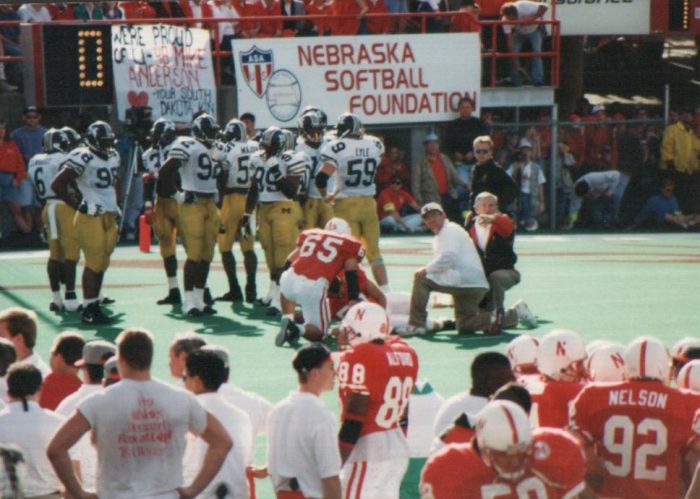
Jon Pedersen: The Final Play
Q: You were a scholarship guy, weren’t you?
JP: Yes, I was.
Q: So that transition into the coaching aspect, what stands out from that?
JP: Well, the physical part wasn’t there, but those guys put in some marathon hours. I would show up, and my job was to get the defensive scout team prepared for our offensive linemen. So we’d come in -myself and Mike Grant and Kyle Emsick- so we’d come up and watch the film of the upcoming week’s team’s defensive schemes, then we would get these cards laid out. It was a real simple job, but the position coaches for each position would watch an amazing amount of film, day in and day out.
Coach Osborne would have a game plan laid out before the game even started, he always knew the first play that he was going to call. Do you remember that? And he would have a set of basic plays that he had in that were just hammered in that week before, so it became automatic muscle memory. Those guys, they put time in from sun-up to sun-down and then some. That’s a part I didn’t realize. I figured they went home when we went home, but that was not the case. Those guys were there until probably midnight every night and then back at six in the morning.
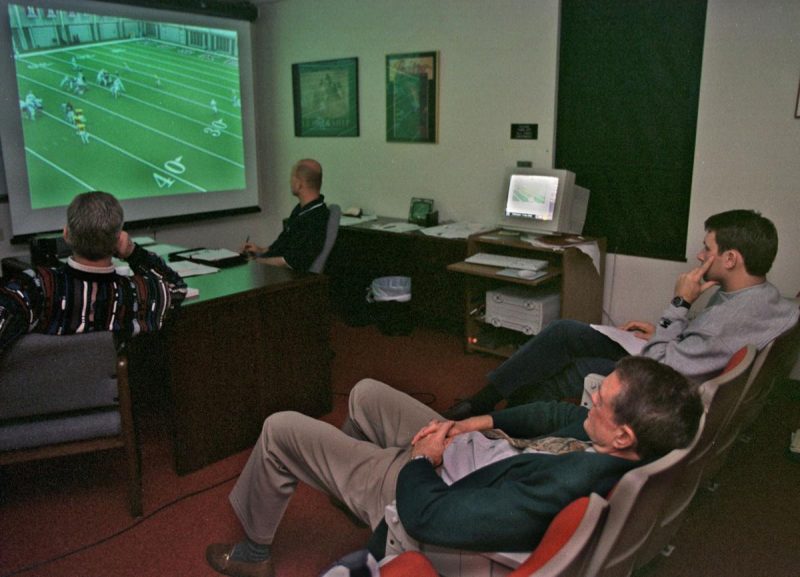
Q: How does that saying go, “Prior planning prevents piss-poor performance”?
JP: Yeah, sure. And when we’d travel I’d get to hang out with Coach Tenopir and Coach Young and Charlie McBride. Those three guys there, they were a pretty tight group. It was a lot of fun. Those guys were characters. Charlie McBride, he was one guy that I’m really glad I got to meet, because that guy’s a legend.
Q: It seems most guys were scared to death of Charlie. Or, at the least, you treated him like a bipolar girlfriend wielding a chainsaw, where you always kind of kept one eye on him no matter the setting…
JP: See, the offensive linemen would practice in that old, little indoor facility there and Charlie would have his guys next door in Schulte Fieldhouse and we’d be in there running our drills, and all of a sudden you’d hear this little ‘Charlie McBride explosion’-because his yell was unmistakable, it had a little higher pitch to it and was extremely loud- and then you’d see a helmet go flying.
And it was usually aimed at Kevin Ramaekers. He had a lot of meltdowns on Kevin. (laughs) We’d just stand there and laugh and be like, “Man, I’m glad I’m not in there getting that ass-chewing.”
Q: If you could, contrast Charlie with Milt…
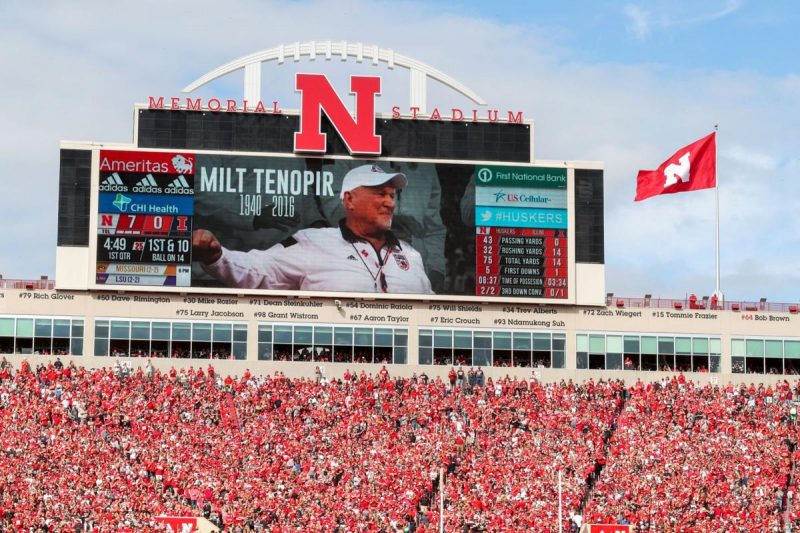
JP: Milt was a real serious guy, but he was extremely emotional. Coming up to a big game that guy would get pumped up. Him and Dan Young both were probably geniuses as far as blocking schemes and techniques, they knew exactly what they wanted, you know? Milt was probably more in tune with the guards and tackles and Coach Young had the centers. Coach Tenopir loved those big offensive tackles, those bookend guys. That was the old sweep-left days, so he had a special liking for the big guys, 6’7” guys.
Q: The Tom Punts, the Jake Youngs, Doug Glasers…
JP: Exactly. Those were Milt’s boys.
Q: Those were some rangy dudes, man.
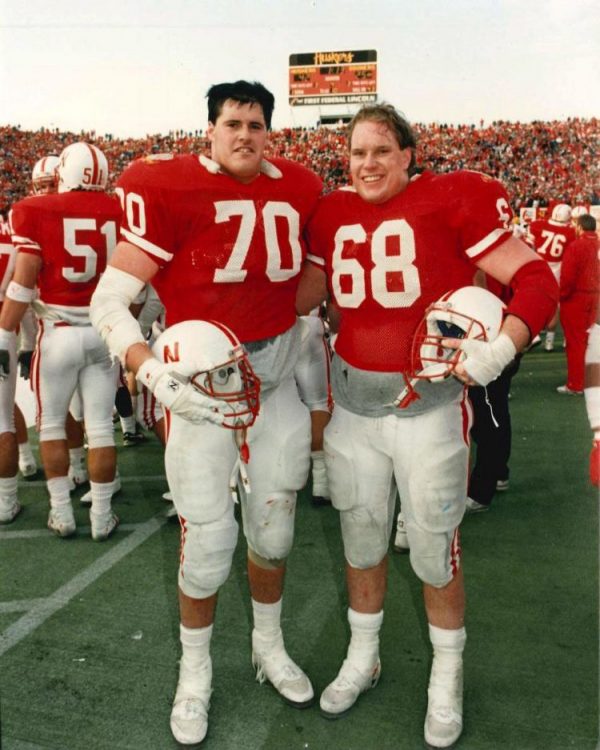
Doug Glaser & Jake Young
JP: And all the coaches -outside of Kevin Steele- were all extremely fair. They were just a real fair bunch of guys. They never really showed any favoritism, per se. Even if you weren’t the marquee player or just kind of the average white guy like I was, they treated you respectfully and treated you fair. They were genuinely concerned about you and your family and your mom and dad, what you had going on. It wasn’t like you were just showing up and you were the blocking dummy. They always knew kind of what was going on with you, if you started getting in trouble grade-wise they would pull you in and see what was going on, or an outside issue.
Coach Osborne, believe it or not, he would sit you down -that was probably the most intimidating thing when you first got there- was that first meeting with him, going in there and meeting one-on-one, and him trying to find out what was going on with me. That was pretty scary.
Q: Tell me about that meeting. What brought that about?
JP: I think what he was trying to get at was where our mindset was. It was like, “If you’re going to show up and be a ‘me, me, me’ player and if you’d say, “Hey Coach, what can you do for me?”, or if you were, “What can I do to help out the team?” I think that’s what he was looking for. He wanted the guys who were willing to do anything.
Because, like I said, I don’t know how many times I’d try just to get on the field, bugging Coach Young, ‘Just get me out there. I’ll be on the kickoff return team.’ Or if a guard went down I’d be, ‘Hey, I can play guard. Get me in there.’ But it was so competitive. And if you look past the first and second string, then the third and fourth string guys could play, too. It wasn’t like a high school team where if you lost a starter you were done for the year.
Q: How would Coach Osborne try to feel you out as to what kind of player you were?
JP: Well, he’d bring you in when you first got there. And the guy just kind of kept a silent eye on everyone. My redshirt year I got into a lit bit of a rut school-wise, academically, and my grades went south one semester. And as soon as grades came out I was in his office that day and he was, “What the heck is going on?” He’d get you in there and set your mind straight.
A motivator like that, he made it very clear that, “Hey, if your school work goes south, guess what? There’s no more football. You’re not here to play football, you’re here to go to school.” He’d keep everybody’s priorities straight. Rarely would anybody try to go outside those boundaries and challenge him, because you’d be a fool to do so. He ran a very tight ship. He knew exactly where everybody was at.
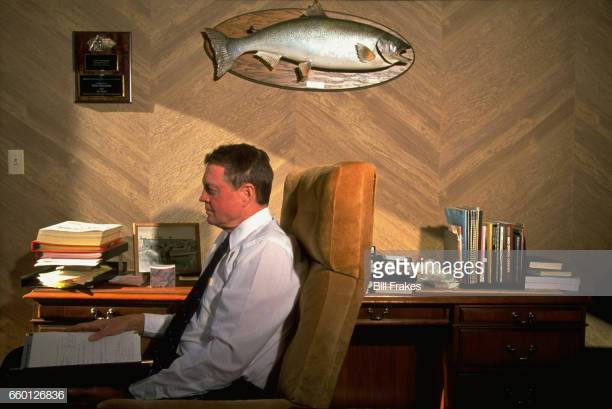
Tom Osborne seated in his office, 12/7/1993
(Photo by Bill Frakes /Sports Illustrated/Getty Images)
Q: So much for the whole Lawrence Phillip-era issues and the supposed “lack of institutional control” theories, huh?
JP: Yeah, but there’s just some people that he’d never ever be able to do anything for. Granted, we’re all 18, 19, 20, 21, and some guys are probably more mature for their age and they weren’t gonna stand for that, but he definitely tried to help everyone the best he could. I don’t think you could fault him for that.
Q: And what about Coach Young? Being a long-snapper, tell me about him…
JP: He might be somewhat of a mystery because he was relatively quiet. That guy would give you the shirt off his back. He was actually really funny. When I talk to Jason Pesterfield now, we always talk about the Dan Young one-liner quotes. Just the way his voice was, he just had that voice.
Q: That deep, drawn out drawl…
JP: Yeah, he was pretty mellow, though. I never saw him get really emotional. A lot of people didn’t even know he was a math teacher before he came to Nebraska. Again, another guy who was more than willing to listen to you or help out with any concerns you may have had.
To be continued tomorrow….

Available on Amazon.com
Copyright @ 2013 Thermopylae Press. All Rights Reserved.
Photo Credits : Unknown Original Sources/Updates Welcomed
Author assumes no responsibility for interviewee errors or misstatements of fact.